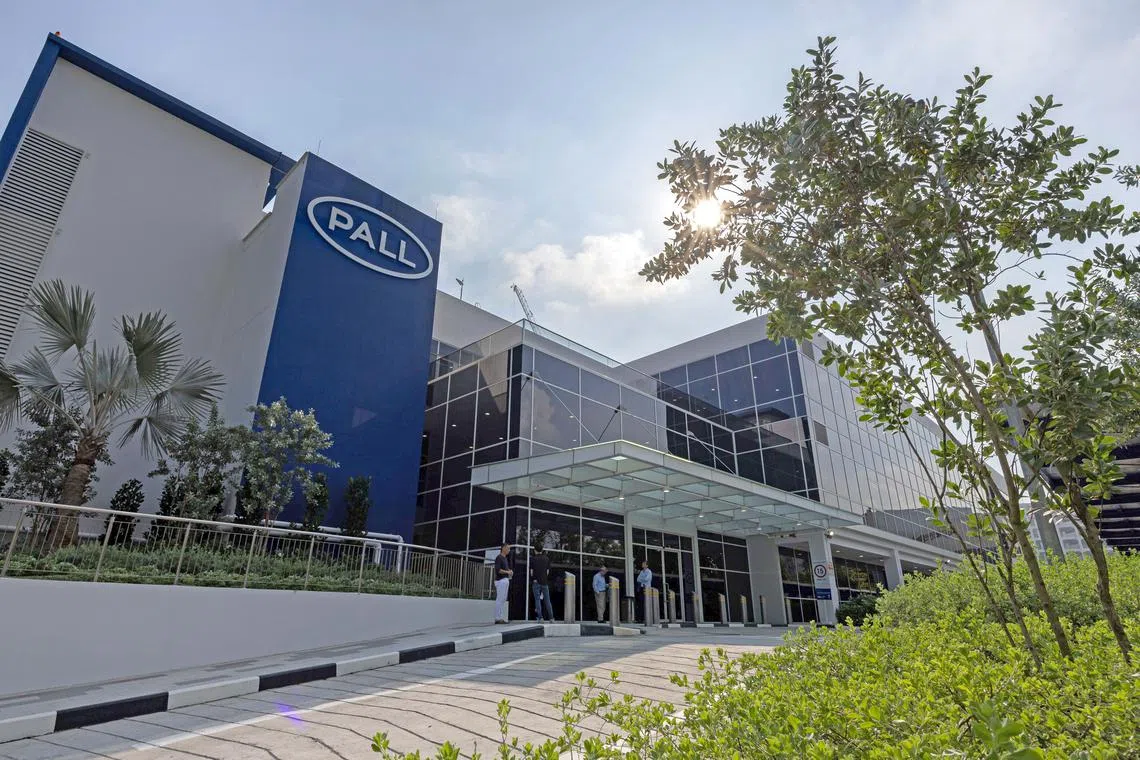Pall Corp opens $202m manufacturing plant in S’pore, will create up to 300 jobs
Sign up now: Get ST's newsletters delivered to your inbox

The 2.8ha facility in the Benoi Sector industrial area includes more than 18,000 sq m of high-volume manufacturing, and office space.
ST PHOTO: BRIAN TEO
SINGAPORE - Pall Corporation, an advanced manufacturing tools and technology supplier, has opened its new US$150 million (S$202 million) plant in Singapore that will create as many as 300 jobs over the next few years.
The Singapore facility of the US-based company, which holds a vast portfolio of material and process technologies that filter, separate and purify chemicals and minerals, will primarily produce filters used in processes for advanced node chip manufacturing. The plant will mainly serve regional and global customers.
“This new facility is not only an important development for advancing semiconductor manufacturing technology, but also an important next step for Pall,” said Mr Naresh Narasimhan, Danaher Group executive for high growth markets and Pall Corporation, at the opening ceremony on June 13. Danaher is Pall’s parent company.
The now-completed 2.8ha facility in the Benoi Sector industrial area includes more than 18,000 sq m of high-volume manufacturing and office space for the global headquarters of Pall’s microelectronics business, the company said.
The facility will also integrate core research and development capabilities in the future, it added.
The 300 jobs will be in the areas of science, engineering and advanced manufacturing. The company, which came to Singapore in 1984, will also focus on training and developing new talent, as well as enabling transfer of knowledge.
Mr Alvin Tan, Minister of State for Trade and Industry, speaking at the opening ceremony, said the semiconductor sector is key to Singapore’s manufacturing industry, and has attracted new investment in recent years from well-known industry players such as Taiwanese chipmaker United Microelectronics Corporation and test service provider Ardentec; German hyperpure silicon wafer maker Siltronic; and Japanese chip packaging materials company Toppan.
On June 5, Taiwan’s Vanguard International and the Netherlands’ NXP announced their plan to create a joint venture, VisionPower Semiconductor, which will build a new plant in Singapore to make wafers – silicon discs on which semiconductor chips are etched and then carved out.
Mr Tan said megatrends such as artificial intelligence, 5G networks and electrification will drive the demand for more chips over the next decade and will add additional semiconductor manufacturing capacities. “We expect further investments from companies across the semiconductor value chain.”
Mr Casey Mace, deputy chief of mission at the US Embassy in Singapore, said: “Pall’s decision to build this facility here in Singapore is yet another example of American companies’ strong vote of confidence in Singapore’s business climate, talent and strategic position in global supply chains.”
He said the pace of change in Singapore and the fast growth of American investment in its strategic sectors are staggering, with more than US$300 billion in foreign direct investment stock.
Nearly 6,000 American companies are active here, and many use Singapore as their regional headquarters and base to export to the rest of the world.
In a statement, Mr Tan Kong Hwee, executive vice-president of Singapore’s Economic Development Board, said Pall’s plant will not only strengthen Singapore’s position as a critical node within the global semiconductor industry, but also improve the resilience of the supply chain for the region.
“Singapore is committed to nurturing talent, building our research and development capabilities and ecosystem, and working with the industry to build a robust and diverse advanced manufacturing cluster,” he added.
In a separate interview, Mr Narasimhan said Pall Corporation has built up its presence in Singapore over the past 40 years – from a trading and distribution business focused only on South-east Asia to establishing its Asia-Pacific headquarters here, and now to setting up its most advanced manufacturing site and technology development centre.
He said that when choosing a site for the new advanced manufacturing site, Pall looked where it already has a long-term presence; the availability of talent; and a robust supply chain infrastructure.
“Clearly, all of this collectively made it very attractive for us to be based in Singapore,” he told The Straits Times.
Talking about future plans in Singapore, Mr Narasimhan said Pall has just started the first phase of development with this new site, which almost doubles its global capability in terms of manufacturing.
“We could further step up another three phases,” he added.



